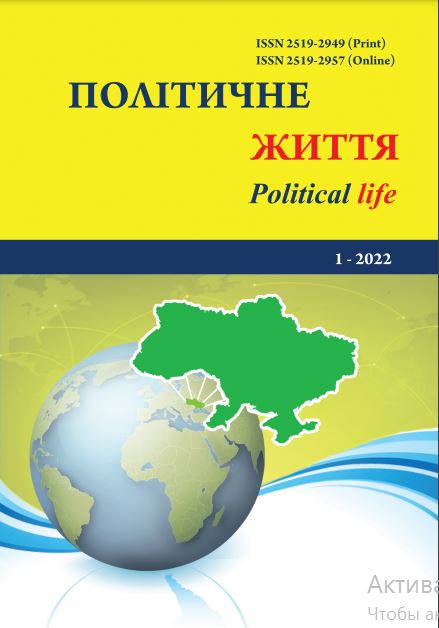Теоретичний вимір дослідження ідеологічного чинника світових політичних процесів
DOI:
https://doi.org/10.31558/2519-2949.2022.1.12Ключові слова:
політична ідеологія; конфлікт; міжнародні відносини; демократія; політична діяльністьАнотація
У статті здійснено спробу концептуалізації підходів до визначення природи і місця політичної ідеології, її основних суспільних функцій, а також структурних рівнів функціонування політичних доктрин. Серед основних функцій політичної ідеології автор розглядають такі: об’єднання суспільства навколо певних цінностей, функцію легітимації політичної влади, мобілізації людей для вирішення завдань суспільного розвитку, функцію соціальної амортизації, що полягає в здатності інтерпретувати соціальну дійсність і послаблювати напруженість в ситуаціях конфлікту між потребами людей і реальними можливостями їхнього задоволення.
Автори виокремили такі рівні функціонування політичних доктрин у структурі політичної ідеології: перший рівень – теоретико-концептуальний; другий – програмно-політичний, і третій, актуалізований рівень політичної ідеології. Сама політична ідеологія, на думку авторів, є продуктом модернізації, оскільки в традиційному суспільстві нічого подібного до ідеології в сучасному значенні цього слова не існувало.
Були окреслені погляди провідних теоретиків на ідеологічні течії з огляду на їх підхід до шляхів та способів вирішення конфліктів, а також з урахуванням бачення економічного розвитку. Таким чином, були розглянуті дві великі групи ідеологій: помірні та радикальні. До помірних можна віднести всі три так звані «великі» ідеології сучасності: ліберальну, консервативну та соціалістичну. Політичний радикалізм, у свою чергу, поділяється на два типи – правий і лівий. Систематизовано погляди теоретиків щодо переконань, які лежать в основі системи ідейних цінностей сучасних політичних ідеологій. Такі ідейні цінності визначають зміст політичної діяльності.
Автори зазначають, що ідеологія виступає інструментом для конструювання основних механізмів політичної поведінки, стає свідомим або несвідомим зміненим уявленням з метою виправдання політичного панування, сприяючи мобілізації мас і маніпулюванню поведінкою людей.
Посилання
Bernstein E. Evolutionary Socialism. New York : Schocken, 1961. 224 p.
Shils E. The Constitution of Society. Chicago : University of Chicago Press, 1982. 414 p.
Белл Д. Китайська модель. Політична меритократія та межі демократії / пер. з англ. : О. Демʼянчук. Київ : Наш формат, 2017. 312 с.
Мангайм К. Ідеологія та утопія / пер. з нім. : В. Швед. Київ : Дух і Літера, 2008. 370 с.
Маркс К. Капитал. Київ : «Видавничий союз Андронум», 2021. 960 с.
Примуш М.В., Клюжев О.В. Політична Конфліктологія: теорія і практика: навч. посіб. Донецьк, 2011. 144 с.
Прудон П.-Ж. Система экономических противоречий, или Философия нищеты. Том 1 / пер. с фр. : А. Антонов-Овсеенко. Харьков : Фоліо, 2021. 656 с.
Сміт А. Багатство народів. Дослідження про природу та причини добробуту націй / пер. з англ. : О. Васільєва. Київ : Наш формат, 2018. 722 с.
Штринер М. Единственный и его собственность / пер. с нем. : М. Гохшиллер, Б. Гиммельфарб. Москва : Рипол Классик, 2016. 464 с.

